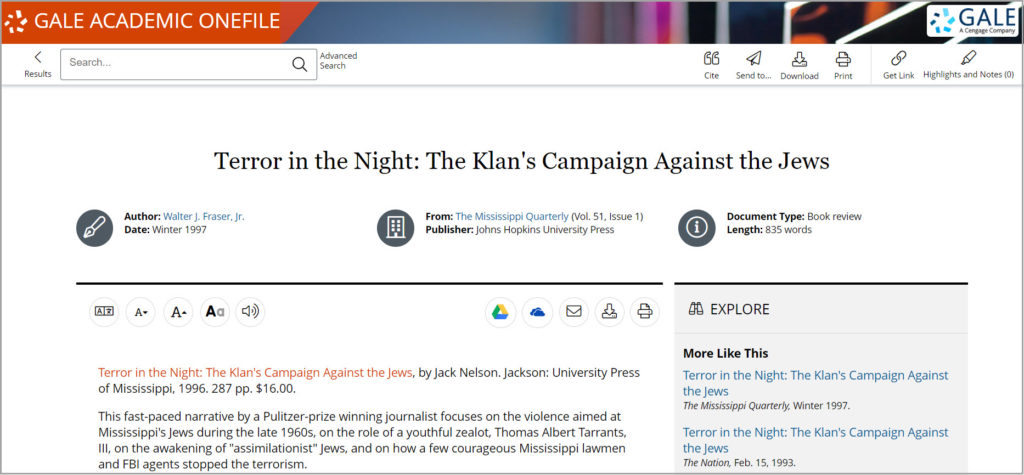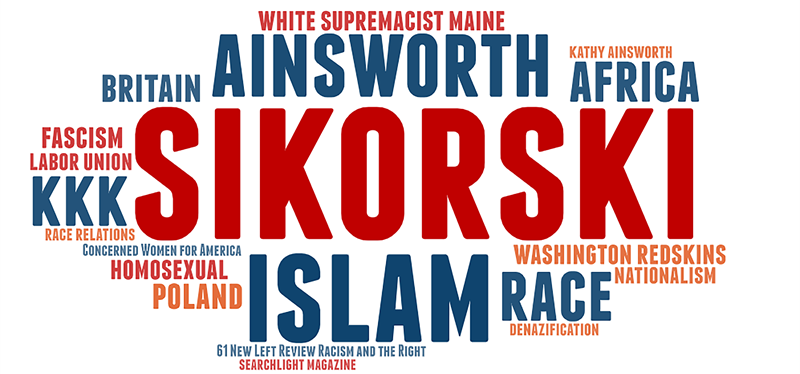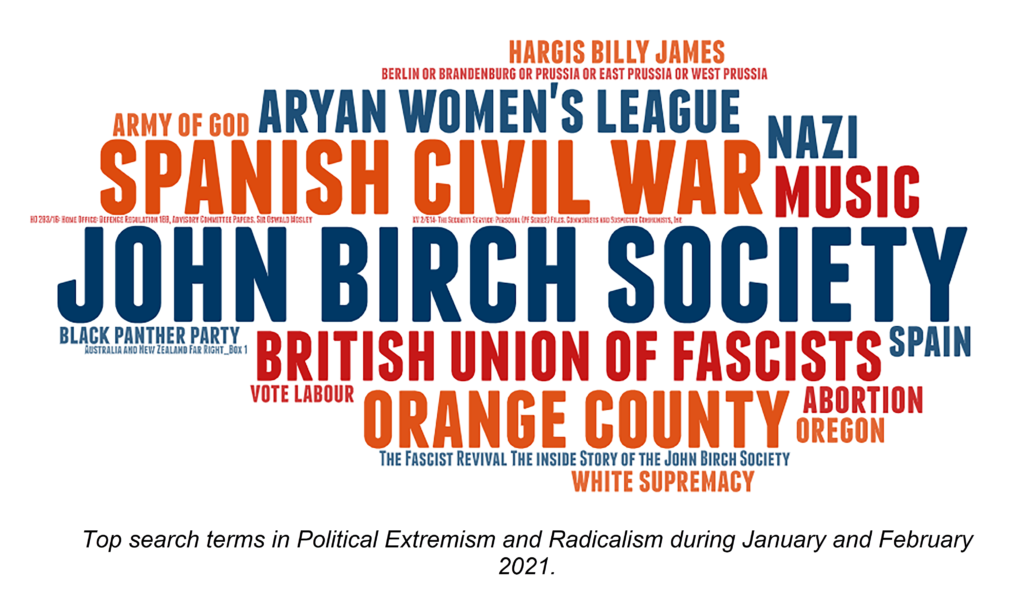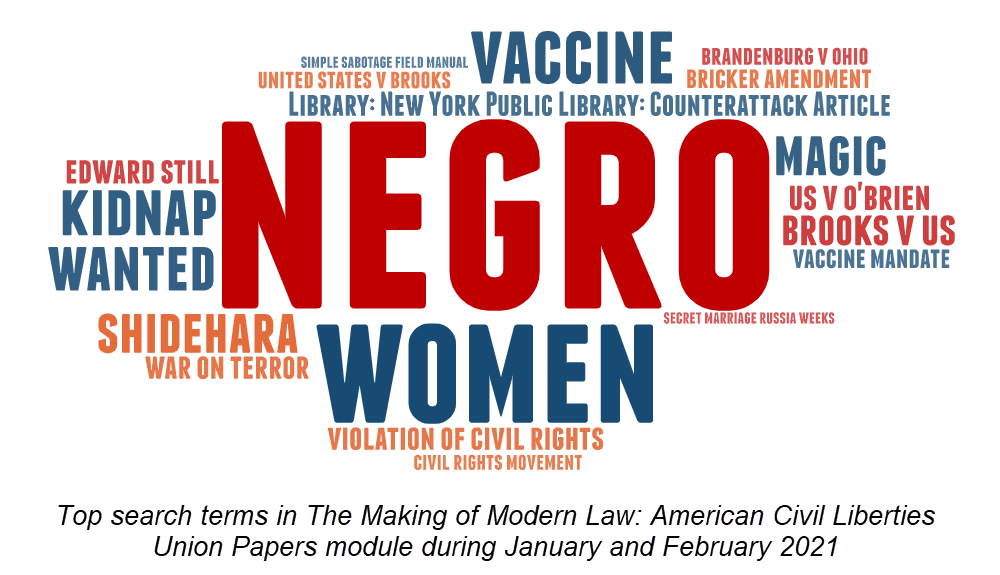| By Rachel Holt, Gale Primary Sources Acquisitions Editor |
The ideologies held by modern extremist groups can often be linked to events of the past, and can have an influence on contemporary events. Such is the case of the January 6, 2021, attack on the U.S. Capitol.
According to unique data retrieved from Gale’s Usage Dashboard, searches related to Far Right movements, historical events, and political extremism started gaining traction in 2020, but grew significantly after January 2021 and increased notably over the course of the year.
These search trends provide new insight into the events that took place in Washington, D.C., during 2021, as well as the relationship between history and the current state of political extremism in the United States.
2020 trend: “Ainsworth” and “Kathy Ainsworth” were among the most-frequently searched terms in Gale’s Political Extremism and Radicalism database.
- In 1968, Kathryn (Kathy) Ainsworth and an accomplice—both members of the Ku Klux Klan (KKK)—attempted to bomb the home of Meyer Davidson—a Jewish businessman.
- The foiled attack happened during a streak of anti-Semitic violence in Mississippi, which occurred during the late 1960s.
Related resources:
- “Terror in the Night: The Klan’s Campaign against the Jews” (Johns Hopkins University Press, accessed via Gale)
- “FBI Foils Meridian Bombing Plot” (Mississippi History Timeline)

2021 trend: “John Birch Society” was the most-frequently searched term in Gale’s Political Extremism and Radicalism databases. The sixth most-searched term was a related pamphlet, “The Fascist Revival: The Inside Story of the John Birch Society.”
- Founded in 1958, the John Birch Society (JBS) is an American right-wing political advocacy group that promotes ultraconservative causes. It is believed that JBS had a resurgence during the 2010s and, most recently, during the Trump administration.
- Published in the 1960s, The Fascist Revival: The Inside Story of the John Birch Society claims that “traditional American democracy and Constitutional liberties are being menaced.”
Related resources:
- “The Right Side of the 1960s: The Origins of the John Birch Society in the Pacific Northwest” (JSTOR)
- “Michigan Has Long Been Fertile Ground for the Far Right” (Detroit Free Press)
2021 trend: Searches for “Oswald Mosley” and “British Union of Fascists” increased.
- Sir Oswald Mosley, sixth baronet of Ancoats, was a British politician and member of Parliament. In 1932, Mosley formed and became the leader of the British Union of Fascists. On October 4, 1936, Mosley led his supporters on a march through the East End, which resulted in riots between anti-Fascists and Blackshirts (British Fascists).
- The British Union of Fascists was renamed the National Socialists in 1936 and the British Union in 1937, and was said to be modeled after Adolf Hitler’s National Socialist German Workers’ Party.
Related resources:
- “Who Was Sir Oswald Mosley?” (BBC)
- “The Enduring Lessons of the Battle of Cable Street, 80 Years On” (TIME)
2021 Trend: In Gale’s “The Making of Modern Law: American Civil Liberties Union Papers” module, searches for “Brandenburg v. Ohio 395 U.S. 444 (1969)” increased.
- Brandenburg v. Ohio was a landmark decision of the United States Supreme Court interpreting the First Amendment to the U.S. Constitution. The court held that the government cannot punish inflammatory speech unless that speech is “directed to inciting or producing imminent lawless action and is likely to incite or produce such action.”
- Clarence Brandenburg, a KKK leader in rural Ohio, held a rally in 1964 at which he claimed that “our President, our Congress, our Supreme Court, continues to suppress the white, Caucasian race,” and announced plans for a march on Congress to take place on the Fourth of July. Brandenburg was charged with advocating violence under Ohio’s criminal syndicalism statute.
Related resources:
- U.S. Reports: Brandenburg v. Ohio, 395 U.S. 444 (Library of Congress)
- “The Landmark Klan Free-Speech Case behind Trump’s Impeachment Defense” (Washington Post)
What these usage trends tell us
These usage trends underscore the desire of scholars to reference history to inform the present. The January 6 attack on the U.S. Capitol didn’t happen in a vacuum, and it’s important that the events that led up to this point remain at the forefront. Materials such as primary sources are critical to document the past and inform political extremism research.
Learn more about Gale’s rare primary source collections on political extremism >>

Meet the Author
Rachel has worked in a variety of roles across the publishing industry and joined the Gale Primary Sources acquisition team in 2017, taking on responsibility for the Women’s Studies Archive programme. Although women’s history is a personal passion, her other area of focus is fringe politics and Rachel is also in charge of Gale’s Political Extremism & Radicalism series.




